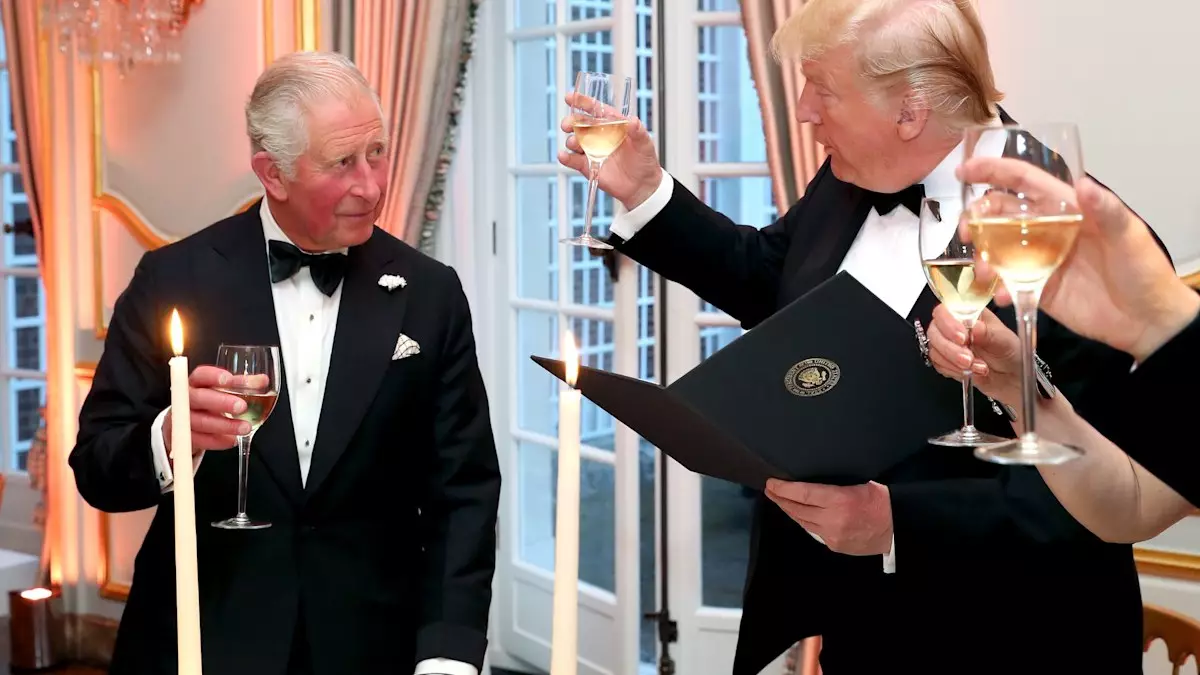Donald Trump is set to make history with a second state visit to the UK, scheduled for September at Buckingham Palace. This visit is not merely a coincidence; it symbolizes an evolving relationship between the United States and the British monarchy, particularly in light of Trump’s unique and contentious political journey. His prior visit in 2019 was marked by pomp and circumstance, but this upcoming event signals not just a continuation but also an expansion of diplomatic ties during an era of uncertainty and change.
In a press briefing from the Oval Office, Trump conveyed his excitement, declaring that he has been invited by King Charles himself, referring to the occasion as a “fest.” Trump’s choice of words strikes a chord, reflecting both the casual tone he often employs and the significance of the occasion. This isn’t just a visit; it’s imbued with an air of festivity and familiarity. The personalization in Trump’s remarks, where he mentions his respect for the royal family, specifically King Charles and King William, speaks volumes about the personal connections he aims to foster, further embedding his presidency’s legacy in the fabric of British-American relations.
A Historical Context
Traditionally, second-term U.S. presidents do not receive state visits from foreign leaders, making this occurrence unique and noteworthy. Such visits are typically reserved for significant anniversaries or milestones, but this arrangement defies the norm. British Prime Minister Sir Keir Starmer’s decision to invite Trump back exemplifies a pragmatic approach to diplomacy that prioritizes the strengthening of international alliances, even in unconventional circumstances.
Starmer’s presence at the Oval Office earlier this year, wherein he formally extended the invitation to Trump, encapsulates a mutual respect that has been cultivated over the years. Despite the tumultuous political climate in both nations—marked by shifting parties, public opinion, and geopolitical tensions—this visit might offer a renewed platform for discussing pressing global issues. It emphasizes the idea that diplomacy can frequently find a path through personal relationships, echoing historical precedents where personal rapport has led to significant political gains.
Symbolism of the Event
The notion of a ceremonial state visit, characterized by grand gestures and formalities, represents more than just a meeting of heads of state. It is a ritualistic reaffirmation of alliances, reinforcing traditions that hold significant weight in both British and American contexts. For Trump, this is an opportunity to align himself with the royal family publicly, showcasing a potential shift in narrative following a tumultuous first term marred by polarization.
Additionally, the personal touch added by Trump’s acknowledgment of the royal family signifies an intention to engage both politically and culturally. His reflections on his friendship with Prince William, discussions about family health matters, and fond memories of Queen Elizabeth depict a human side to politics often lost in the fray of public discourse. Such narratives may help bridge gaps and soften the often abrasive tone of modern political interaction.
The Implications Ahead
As the state visit approaches, various implications emerge, particularly concerning bilateral relations moving forward. Both Trump’s administration and the British government will likely utilize this stage to discuss priority agendas—from trade discussions to military partnerships—underscoring the importance of cohesion in an ever-fractured international arena.
However, the backdrop of Trump’s controversial past raises questions regarding the reception of this visit both domestically and abroad. While some may herald this as a victory for diplomatic resilience, others will scrutinize the decision to honor a leader retaining a divisive global presence. It is a living embodiment of the complexities intertwined in modern diplomacy, marked by personal ties and polarized public sentiment.
In essence, Trump’s upcoming royal festivity is not just a formal acknowledgment of political ties but a manifestation of the high-wire act that is contemporary governance, where history, personal relationships, and public perception intermingle, setting the stage for future engagements. As we anticipate this exceptional event, it is worth considering how this relationship will evolve and what precedent it might set for future leaders navigating the delicate dance of international diplomacy.

